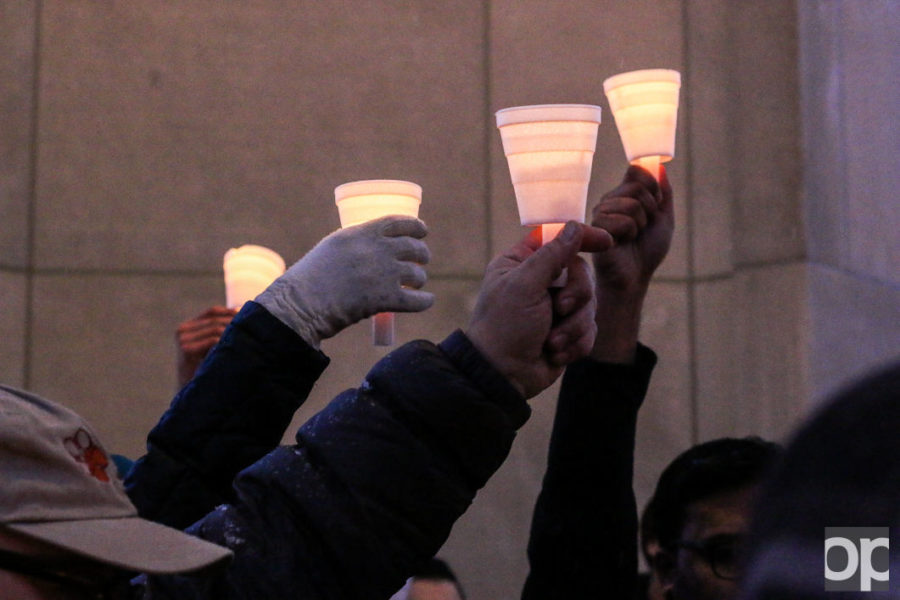Physically far, but close to the heart: OU students honor UNC victims
Correction: we originally reported that there were roughly 50 attending the the MSA’s vigil. There were actually around 100 in attendance. The story has since been updated.
Police responded to a report of gunshots and screams Tuesday, Feb. 10, in Chapel Hill, North Carolina. They found three Muslim students shot and killed in their family’s home.
A week later, OU’s Muslim Student Association held a vigil to honor Deah Shaddy Barakat, 23, his wife, Yusor Mohammad Abu-Salha, 21, and her sister, Razan Mohammad Abu-Salha, 19.
Police think that the shooting happened over a parking dispute between the students and Craig Hicks, 46, their neighbor, according to the New York Times, but the investigation is ongoing.
The family and Zienab Fahs, president of OU’s Muslim Student Association, think that it was a hate crime.
Candles were lit, and Fahs told her fellows students she wanted all victims of hate crimes to be remembered. She said that even though history repeats itself, hate crimes need to be stopped.
“Why is that a justifiable excuse to let this go on?” she asked a solemn audience of roughly 100 under the Elliott Clock tower.
Jumah Khan, a public administration and public policy major, spoke about the victims’ lives. He emphasized their community involvement and encouraged those at the vigil to get involved as well.
“Be yourself and try to help out in your community.”
Shereen Abunada, a communication major and the public relations chair of the association, read a poem called “Today, I wrap my hijab a little tighter.” A hijab is a head scarf that most Muslim women wear as a sign of modesty, Abunada said. She has been wearing a hijab since she was 11.
“It makes you wonder, is it going to be me next?” she said.
Even though she couldn’t stop thinking about the victims, she said she feels the shooting didn’t get enough coverage.
“There’s just a lot of silence,” she said.
Fahs asked for a moment of silence, and those at the vigil lifted their candles in honor of hate crime victims.
After, Fahs said that little changes and awareness can lead to big changes.
“Don’t stay quiet,” she said. “Every minority counts, every soul counts.”
Damien Moore, a studio art major, also spoke. He asked the audience to look around and see that everyone has a face and skin and is human.
“That means we coexist. We exist. And you can’t change that,” he said.
Moore said that love keeps us going, and that the victims must have felt as cold as the falling snow as the victims died and the love left them. He said that the candles not only represent those who have fallen, but those who will rise to remember them.
He said that whatever differences people have, they need to work toward unity and love.
It’s unfortunate that it often takes a tragedy before people become actively involved in a cause, Moore said.
Khan said he loved the victims’ community involvement and wonders why such beautiful people were killed.
“Sometimes it takes people of beauty to unmask the ugly,” Moore said.








